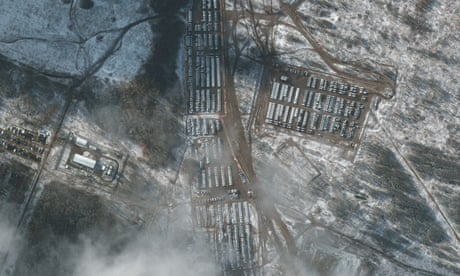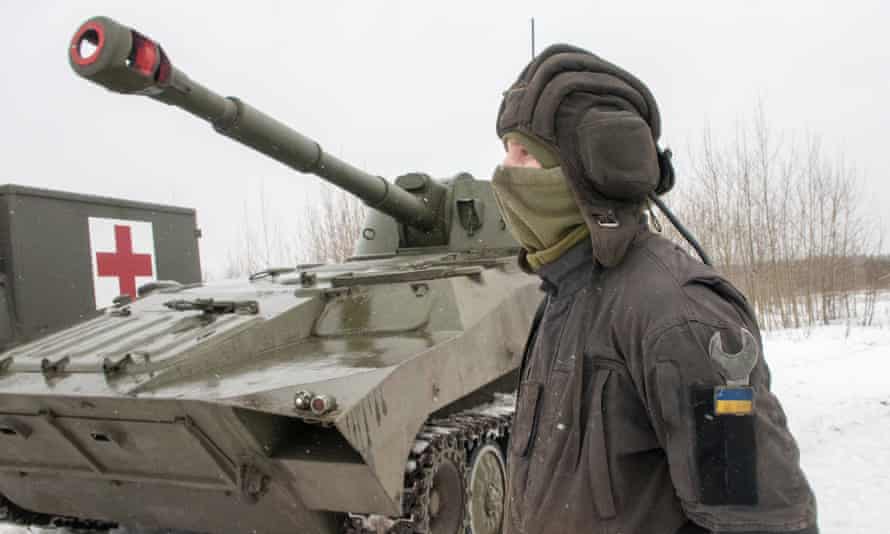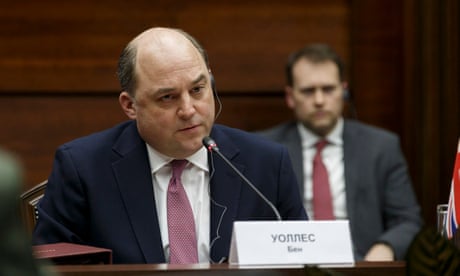World
Biden and Putin to speak as US warns Russia could attack Ukraine ‘any day’
Biden and Putin to speak as US warns Russia could attack Ukraine ‘any day’
US president Joe Biden and his Russian counterpart Vladimir Putin will speak on Saturday as Western nations warned that a war in Ukraine could ignite at any moment.
The US warned on Friday of the “very distinct possibility” of a Russian invasion of Ukraine in the next few days and told all remaining Americans to leave the country in the next 48 hours.
On Saturday, Biden will speak with Putin by phone. Putin requested the telephone call between the leaders to take place on Monday, a White House official said, but Biden wanted to conduct it sooner as Washington detailed increasingly vivid accounts of a possible attack on Ukraine.
Ahead of the discussion, Australia and New Zealand became the latest countries to urge their citizens to leave Ukraine as soon as possible, joining Britain, Japan, Latvia, Norway and the Netherlands. Israel said it was evacuating relatives of embassy staff.
The US is also set to evacuate its embassy in Kyiv. The Associated Press reported the state department will announce early Saturday that all American staff at the Kyiv embassy will be required to leave the country ahead of a feared Russian invasion.
The department had earlier ordered families of US embassy staffers in Kyiv to leave, but left it to the discretion of nonessential personnel if they wanted to depart.

Diplomatic sources said that the US president had told allied leaders in a call that the Russian leader had taken a decision to go ahead with an invasion, but Jake Sullivan, the national security adviser, said: “We have not seen anything come to us that says a final decision has been taken, [that] the go order has been given.”
“I will say that the way that he has built up his forces and put them in place, along with the other indicators that we have collected through intelligence, makes it clear to us that there is a very distinct possibility that Russia will choose to act militarily, and there is reason to believe that that could happen on a reasonably swift timeframe,” Sullivan said.
“Now, we can’t pinpoint the day at this point, and we can’t pinpoint the hour but what we can say is that there is a credible prospect that a Russian military action would take place, even before the end of the Olympics.” The Winter Olympics in China close on 20 February.
“We continue to see signs of Russian escalation, including new forces arriving at the Ukrainian border,” Sullivan told reporters. “We are in the window when an invasion could begin at any time.”
Biden has told other Nato and EU leaders that the US believes Putin has decided to carry out an invasion of Ukraine, which could happen in the next few days, according to diplomatic sources.
Biden’s call to allies followed a situation room meeting at the White House to discuss the latest intelligence on the Russian military buildup, and on Putin’s thinking.
“Practical things will start to happen on the ground as a result of this decision, but that doesn’t mean that Putin couldn’t still row back,” a European diplomat said, insisting it was not too late to deter the Russian leader. “There are further decision points along the line.”
Sullivan said US citizens still in Ukraine should leave in the next two days.
“If you stay you are assuming risk with no guarantee that there will be any other opportunity to leave, and there is no prospect of a US military evacuation in the event of a Russian invasion,” Sullivan said.
“If a Russian attack on Ukraine proceeds, it is likely to begin with aerial bombing and missile attacks that could obviously kill civilians without regard to their nationality. A subsequent ground invasion would involve the onslaught of a massive force with virtually no notice. Communications to arrange a departure could be severed and commercial transit halted.”
Russia wants guarantees from the West, including a promise of no missile deployments near its borders, no Nato membership for Ukraine, and a scaling back of the alliance’s military infrastructure.

The West describes Russia’s main demands as “non-starters” but is willing to talk about arms control and confidence-building steps.
Late on Friday the Russian foreign ministry accused Western countries of spreading false information with help from the media, in order to distract attention from their own aggressive actions.
The White House said Biden was calling transatlantic leaders “to discuss our shared concerns about Russia’s continued buildup of military forces around Ukraine, and continued coordination on both diplomacy and deterrence”.
A European diplomat said that the US had asked for the urgent call with Nato allies and the heads of the EU council and commission, to share the new intelligence.
Western intelligence agencies believe that the most likely goal of a Russian offensive would be to surround Kyiv and force regime change. A number of invasion scenarios are considered possible, but there is a prevailing belief that any military intervention could see a lightning attack, aimed at encircling Kyiv, with the intention of forcing the collapse of President Zelenskiy’s government, and trying to install a pro-Russian regime without urban warfare.
They also believe that the signal for such an invasion would be a false-flag attack, possibly including allegations of Ukrainian use of chemical weapons, that would be used as a pretext for Russian intervention.
Within minutes of Biden’s call, the UK Foreign Office urged British citizens in Ukraine “to leave now via commercial means while they remain available”.
The Russian embassy in Kiev said it was considering telling non-essential staff to leave, according to Tass news agency. Other embassies stepped up evacuations on Friday.
According to Walla News, Israel ordered family members of diplomatic staff out of the country, and the Kyiv Post reported that the US had called for American members of the Ukraine monitoring mission run by the Organisation for Security and Cooperation in Europe to leave the country by Tuesday.
Vice-Admiral Nils Andreas Stensønes, the head of the Norwegian intelligence service, said Russia now had 150,000 troops massed around Ukraine, and said the decision on whether to attack rested with Vladimir Putin.
“Now it is first and foremost up to President Putin if he chooses to do so,” Stensønes said. “It is difficult to say whether it is probable or not probable, because it is solely up to the Russian president to make that decision.”
He added that Russians “have all they need to carry everything out, from a minor invasion in the east to minor attacks here and there in Ukraine, or a complete invasion, with, possibly, an occupation of all or parts of Ukraine”.
Western intelligence agencies largely agree that Putin has now put in place enough troops to attempt an invasion, a sentiment reflected in warnings in the last 24 hours from Biden and the UK prime minister, Boris Johnson.
He emphasised on Thursday that any invasion would amount to a massive miscalculation by Putin because Ukraine would “fight and they will resist very strongly”. .
The raised alert follows the failure of several diplomatic initiatives to lead to a breakthrough. Reports suggested that much of Emmanuel Macron’s more than five hours of talks with Putin in Moscow on Monday, was taken up by lengthy historical lectures from the Russian leader, with very little substance on current events.
Accounts from German officials on “Normandy format” talks in Berlin between Russian, Ukrainian, German and French officials had been difficult and offered no prospects of defusing tensions.
The German chancellor, Olaf Scholz, is due to visit Moscow to see Putin on Tuesday, but his spokesman said he was taking no new diplomatic initiatives with him.
The head of the foreign affairs committee in the Bundestag, Michael Roth, a former minister, said on Twitter: “Russia has effectively annexed Belarus militarily. What are being called “exercises” is really the encirclement of Ukraine, and a concrete threat to Poland and the Baltic States. The situation remains dangerous.”
The Associated Press and Reuters contributed to this report


 Sports12 hours ago
Sports12 hours agoNBA playoffs: Timberwolves cruise past Suns for 2-0 lead despite off night from Anthony Edwards, Karl-Anthony Towns

 Top Stories13 hours ago
Top Stories13 hours agoYahaya Bello: Do Not Allow Yourself Become A Tool Of Political Vendetta And Intimidation – Kogi Assembly To EFCC

 Entertainment12 hours ago
Entertainment12 hours agoBREAKING: Popular Veteran Nollywood Actor is Dead [Video]

 News12 hours ago
News12 hours agoBlack Market Dollar (USD) To Naira (NGN) Exchange Rate Today 24th April 2024

 News13 hours ago
News13 hours agoFG Summons Lead British School Management Over Bullying

 Top Stories7 hours ago
Top Stories7 hours agoColumbia University extends negotiations with student activists over dismantling encampment

 World13 hours ago
World13 hours agoUS Congress passes TikTok sell-or-ban bill, but legal battles loom

 Sports13 hours ago
Sports13 hours agoEPL: Why Chelsea lost 5-0 to Arsenal – Pochettino






